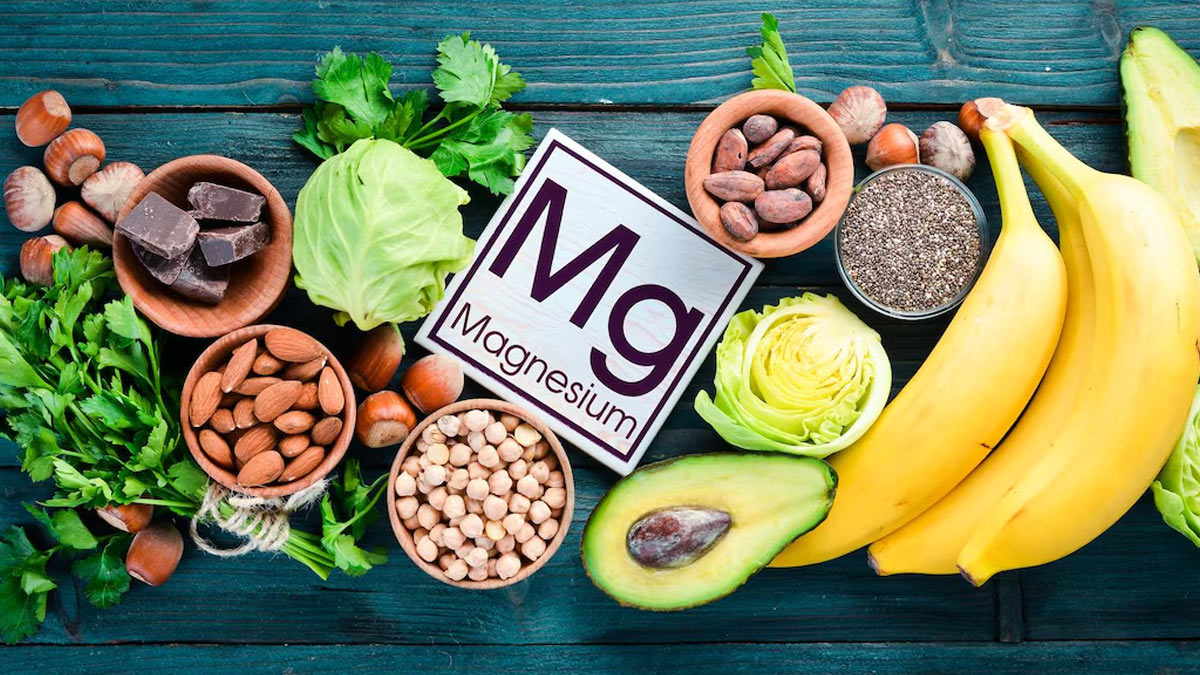
Magnesium might not get the spotlight like calcium or iron, but it’s involved in over 300 vital functions in your body. From sleep and mood to heart and bone health, magnesium is essential—but often overlooked.
Table of Content:-
“Low magnesium levels can disrupt sleep, digestion, hormone balance, and even increase chronic disease risk,” says Dr Archana Batra, Dietician and Certified Diabetes Educator, Gurugram.
Health Benefits Of Magnesium
Here’s a simple, science-backed breakdown of the top 15 health benefits of magnesium—and why your body absolutely needs it.
1. Boosts Muscle Function & Recovery

Magnesium helps muscles contract and relax properly. Low levels? Expect cramps, twitches, or post-workout soreness.
Why it matters: It supports blood sugar movement and removes lactic acid after exercise, helping recovery.
2. Improves Sleep Quality
Magnesium calms the nervous system by regulating GABA—a neurotransmitter that promotes restful sleep.
Study tip: A 2021 study showed people fell asleep 17 minutes faster with magnesium supplements.
3. Eases Anxiety & Stress
Often called “nature’s anti-anxiety mineral,” magnesium regulates the body’s stress-response system (HPA axis).
Result: In just 6 weeks, a daily dose of 248 mg significantly reduced anxiety symptoms.
4. Regulates Blood Sugar

Magnesium improves insulin sensitivity and helps control blood sugar levels—especially helpful for people with or at risk of diabetes.
Also Read: Can You Spot Magnesium Deficiency Without A Test? Expert Shares Signs To Watch Out For
5. Supports Heart Health
Magnesium:
- Keeps your heartbeat steady
- Helps control blood pressure
- Regulates potassium and calcium levels
- Deficiency may lead to arrhythmias or hypertension
6. Fights Inflammation
Chronic inflammation is linked to diseases like arthritis and heart disease. Magnesium lowers C-reactive protein (CRP), a key inflammation marker.
7. Strengthens Bones
Magnesium works with calcium and vitamin D to maintain strong bones.
Fact: Postmenopausal women with higher magnesium intake have better bone density and lower osteoporosis risk.
8. Reduces Migraines
Frequent migraines? You might be magnesium deficient.
Tip: Magnesium citrate or glycinate can reduce migraine frequency and intensity.
9. Balances Hormones (Especially in Women)

Magnesium helps manage PMS symptoms like mood swings, cramps, and bloating.
A 2024 study showed that 300 mg of daily magnesium eased symptoms significantly in young women.
10. Increases Energy Levels
Magnesium is needed to create ATP—your body’s energy molecule. Without enough magnesium, fatigue and weakness are common.
11. Relieves Constipation
Magnesium relaxes the muscles in your gut and improves bowel movements.
Natural laxatives: Magnesium citrate and magnesium hydroxide.
12. Improves Skin Health
Magnesium has anti-inflammatory and antibacterial properties. It helps with acne, eczema, and even reduces cortisol (the stress hormone), which benefits skin clarity.
13. Supports Brain Health & Memory
Magnesium supports nerve signals and brain plasticity (your brain’s ability to change).
Studies suggest it could play a role in preventing cognitive decline and even Alzheimer’s.
14. Protects Against Metabolic Syndrome
Low magnesium is linked to metabolic syndrome (a group of risk factors like belly fat, high BP, and high sugar).
Solution: Increasing magnesium can improve these markers.
15. Maintains Electrolyte Balance
Magnesium works with potassium, sodium, and calcium to regulate:
- Muscle function
- Fluid balance
- Nerve impulses
- Essential during workouts or recovery from illness.
Also Read: Expert Shares The Benefits Of Magnesium To Reduce Stress And Sleep Better You Need To Know Today!
Top Magnesium-Rich Foods
You can get magnesium from both food and supplements. Start with:

- Leafy greens: Spinach, kale
- Nuts/seeds: Almonds, pumpkin seeds
- Legumes: Chickpeas, black beans
- Whole grains: Brown rice, oats
- Others: Avocados, bananas, tofu, dark chocolate
Should You Take a Supplement?
Magnesium supplements are useful if:

- You have absorption issues
- You’re highly stressed
- You’re recovering from illness
- Your diet lacks magnesium-rich foods
Popular forms & their uses:
- Glycinate: Best for sleep, anxiety, PMS
- Citrate: Ideal for digestion and constipation
- Oxide: General use but less bioavailable
“Always consult your doctor—especially if you have kidney issues,” advises Dr Batra.
How Much Magnesium Do You Need?
Recommended Daily Intake (RDA):
- Men: 400–420 mg/day
- Women: 310–320 mg/day
- Needs may increase during pregnancy or high stress.
FAQs About Magnesium
Q1. What organ is most affected by magnesium?
The heart, but also the muscles, brain, and kidneys rely heavily on magnesium.
Q2. What’s the best form of magnesium?
Depends on your need:
- Sleep/anxiety: Glycinate
- Digestion: Citrate
- Brain function: L-Threonate
Q3. What are common signs of magnesium deficiency?
Muscle cramps, fatigue, irregular heartbeat.
Q4. How is magnesium absorbed?
It’s absorbed in the small intestine and distributed to tissues and organs.
Final Takeaway
Magnesium is essential for physical, mental, and emotional wellness. From improving sleep to reducing migraines and stress, its benefits touch almost every area of health. If you feel constantly tired, anxious, or experience muscle issues, it might be time to check your magnesium intake—either through food or supplements.
[Disclaimer: The article has been optimised using ChatGPT. The inputs are exclusive to OnlyMyHealth only.]
Also watch this video
Read Next
Priyanka Chopra Goes ‘Vegetarian’: Quick Recipes With Protein Sources To Replace Non-Veg In Diet
How we keep this article up to date:
We work with experts and keep a close eye on the latest in health and wellness. Whenever there is a new research or helpful information, we update our articles with accurate and useful advice.
Current Version